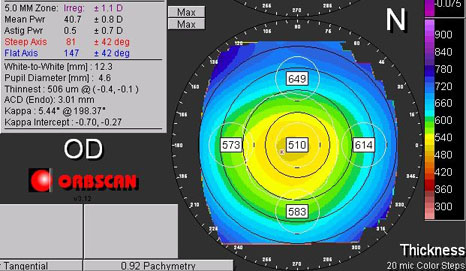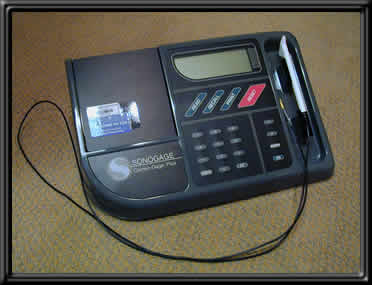Integral in the pre-operative evaluation of every potential laser vision correction patient is measurement of the thickness of their cornea. It is vital for the doctor to know that there is enough tissue in the cornea to allow removal of a certain amount during the re-sculpting by the laser while leaving an adequate amount untreated. By knowing these values, the doctor can assess which laser vision correction procedure is most appropriate for you.
This technique, known as Pachymetry, can be performed several different ways. At Flaum Eye Institute Refractive Surgery Center, your corneal thickness will be measured first by the Orbscan IIz Corneal Analysis System. This form of measurement gives the doctors an overall view of your corneal thickness across the entire cornea. It also identifies the thinnest point in the cornea, both by value and location.

In a normal eye, the thinnest point is very close to the geometric center of the cornea. If the thinnest point measured is off-center, it may be an indication of a corneal health problem.
After measurement with the Orbscan, your corneal thickness will be measured with an Ultrasonic Pachymeter. We believe in double checking everything to maximize safety. This instrument uses ultrasonic sound waves to determine the exact thickness of your cornea. By painlessly touching the sensor probe to your cornea, a number of points will be tested to determine the thinnest area.
Patient with adequate thickness to their corneas may be candidates for LASIK while those with thinner corneas may be safer considering PRK as their treatment option.

During your laser vision correction procedure, Dr. MacRae will use the identical instrument to measure your cornea after treatment to know exactly what the remaining thickness is. These readings will help with your future eye care after treatment. All of this testing is designed to help us protect your most precious sense, your vision.